- Home
- Howard Pyle
Twilight Land Page 29
Twilight Land Read online
Page 29
All Things are as Fate wills.
Once upon a time, in the old, old days, there lived a king who hada head upon his shoulders wiser than other folk, and this was why:though he was richer and wiser and greater than most kings, andhad all that he wanted and more into the bargain, he was so afraidof becoming proud of his own prosperity that he had these wordswritten in letters of gold upon the walls of each and every room inhis palace:
_All Things are as Fate wills._
Now, by-and-by and after a while the king died; for when his timecomes, even the rich and the wise man must die, as well as the poorand the simple man. So the king’s son came, in turn, to be king ofthat land; and, though he was not so bad as the world of men goes,he was not the man that his father was, as this story will show you.
One day, as he sat with his chief councillor, his eyes fell uponthe words written in letters of gold upon the wall--the words thathis father had written there in time gone by:
_All Things are as Fate wills_;
and the young king did not like the taste of them, for he was veryproud of his own greatness. “That is not so,” said he, pointing tothe words on the wall. “Let them be painted out, and these wordswritten in their place:
_All Things are as Man does._”
Now, the chief councillor was a grave old man, and had beencouncillor to the young king’s father. “Do not be too hasty, mylord king,” said he. “Try first the truth of your own words beforeyou wipe out those that your father has written.”
“Very well,” said the young king, “so be it. I will approve thetruth of my words. Bring me hither some beggar from the town whomFate has made poor, and I will make him rich. So I will show youthat his life shall be as I will, and not as Fate wills.”
Now, in that town there was a poor beggar-man who used to sit everyday beside the town gate, begging for something for charity’s sake.Sometimes people gave him a penny or two, but it was little ornothing that he got, for Fate was against him.
The same day that the king and the chief councillor had had theirtalk together, as the beggar sat holding up his wooden bowl andasking charity of those who passed by, there suddenly came threemen who, without saying a word, clapped hold of him and marched himoff.
It was in vain that the beggar talked and questioned--in vain thathe begged and besought them to let him go. Not a word did they sayto him, either of good or bad. At last they came to a gate that ledthrough a high wall and into a garden, and there the three stopped,and one of them knocked upon the gate. In answer to his knocking itflew open. He thrust the beggar into the garden neck and crop, andthen the gate was banged to again.
But what a sight it was the beggar saw before his eyes!--flowers,and fruit-trees, and marble walks, and a great fountain that shotup a jet of water as white as snow. But he had not long to standgaping and staring around him, for in the garden were a greatnumber of people, who came hurrying to him, and who, withoutspeaking a word to him or answering a single question, or as muchas giving him time to think, led him to a marble bath of tepidwater. There he was stripped of his tattered clothes and washedas clean as snow. Then, as some of the attendants dried him withfine linen towels, others came carrying clothes fit for a prince towear, and clad the beggar in them from head to foot. After that,still without saying a word, they let him out from the bath again,and there he found still other attendants waiting for him--two ofthem holding a milk-white horse, saddled and bridled, and fit foran emperor to ride. These helped him to mount, and then, leapinginto their own saddles, rode away with the beggar in their midst.
They rode out of the garden and into the streets, and on and onthey went until they came to the king’s palace, and there theystopped. Courtiers and noblemen and great lords were waiting fortheir coming, some of whom helped him to dismount from the horse,for by this time the beggar was so overcome with wonder that hestared like one moon-struck, and as though his wits were addled.Then, leading the way up the palace steps, they conducted himfrom room to room, until at last they came to one more grand andsplendid than all the rest, and there sat the king himself waitingfor the beggar’s coming.
The beggar would have flung himself at the king’s feet, but theking would not let him; for he came down from the throne where hesat, and, taking the beggar by the hand, led him up and sat himalongside of him. Then the king gave orders to the attendants whostood about, and a feast was served in plates of solid gold upon atable-cloth of silver--a feast such as the beggar had never dreamedof, and the poor man ate as he had never eaten in his life before.
All the while that the king and the beggar were eating, musiciansplayed sweet music and dancers danced and singers sang.
Then when the feast was over there came ten young men, bringingflasks and flagons of all kinds, full of the best wine in theworld; and the beggar drank as he had never drank in his lifebefore, and until his head spun like a top.
So the king and the beggar feasted and made merry, until at lastthe clock struck twelve and the king arose from his seat. “Myfriend,” said he to the beggar, “all these things have been doneto show you that Luck and Fate, which have been against you forall these years, are now for you. Hereafter, instead of being pooryou shall be the richest of the rich, for I will give you thegreatest thing that I have in my treasury.” Then he called thechief treasurer, who came forward with a golden tray in his hand.Upon the tray was a purse of silk. “See,” said the king, “here isa purse, and in the purse are one hundred pieces of gold money.But though that much may seem great to you, it is but little ofthe true value of the purse. Its virtue lies in this: that howevermuch you may take from it, there will always be one hundred piecesof gold money left in it. Now go; and while you are enjoying theriches which I give you, I have only to ask you to remember theseare not the gifts of Fate, but of a mortal man.”
But all the while he was talking the beggar’s head was spinning andspinning, and buzzing and buzzing, so that he hardly heard a wordof what the king said.
Then when the king had ended his speech, the lords and gentlemenwho had brought the beggar in led him forth again. Out they wentthrough room after room--out through the court-yard, out throughthe gate.
Bang--it was shut to behind him, and he found himself standing inthe darkness of midnight, with the splendid clothes upon his back,and the magic purse with its hundred pieces of gold money in hispocket.
He stood looking about himself for a while, and then off he startedhomeward, staggering and stumbling and shuffling, for the winethat he had drank made him so light-headed that all the world spuntopsy-turvy around him.
His way led along by the river, and on he went stumbling andstaggering. All of a sudden--plump! splash!--he was in the waterover head and ears. Up he came, spitting out the water and shoutingfor help, splashing and sputtering, and kicking and swimming,knowing no more where he was than the man in the moon. Sometimeshis head was under water and sometimes it was up again.
At last, just as his strength was failing him, his feet struck thebottom, and he crawled up on the shore more dead than alive. Then,through fear and cold and wet, he swooned away, and lay for a longtime for all the world as though he were dead.
Now, it chanced that two fishermen were out with their nets thatnight, and Luck or Fate led them by the way where the beggar lay onthe shore. “Halloa!” said one of the fishermen, “here is a poorbody drowned!” They turned him over, and then they saw what richclothes he wore, and felt that he had a purse in his pocket.
“Come,” said the second fisherman, “he is dead, whoever he is. Hisfine clothes and his purse of money can do him no good now, and wemight as well have them as anybody else.” So between them both theystripped the beggar of all that the king had given him, and lefthim lying on the beach.
At daybreak the beggar awoke from his swoon, and there he foundhimself lying without a stitch to his back, and half dead with thecold and the water he had swallowed. Then, fearing lest somebodymight see him, he crawled away into the rushes that grew beside ther
iver, there to hide himself until night should come again.
But as he went, crawling upon hands and knees, he suddenly cameupon a bundle that had been washed up by the water, and when helaid eyes upon it his heart leaped within him, for what should thatbundle be but the patches and tatters which he had worn the daybefore, and which the attendants had thrown over the garden walland into the river when they had dressed him in the fine clothesthe king gave him.
He spread his clothes out in the sun until they were dry, and thenhe put them on and went back into the town again.
* * * * *
“Well,” said the king, that morning, to his chief councillor, “whatdo you think now? Am I not greater than Fate? Did I not make thebeggar rich? and shall I not paint my father’s words out from thewall, and put my own there instead?”
“I do not know,” said the councillor, shaking his head. “Let usfirst see what has become of the beggar.”
“So be it,” said the king; and he and the councillor set off to seewhether the beggar had done as he ought to do with the good thingsthat the king had given him. So they came to the town-gate, andthere, lo and behold! the first thing that they saw was the beggarwith his wooden bowl in his hand asking those who passed by for astray penny or two.
When the king saw him he turned without a word, and rode back homeagain. “Very well,” said he to the chief councillor, “I have triedto make the beggar rich and have failed; nevertheless, if I cannotmake him I can ruin him in spite of Fate, and that I will show you.”
So all that while the beggar sat at the town-gate and begged untilcame noontide, when who should he see coming but the same three menwho had come for him the day before. “Ah, ha!” said he to himself,“now the king is going to give me some more good things.” And sowhen the three reached him he was willing enough to go with them,rough as they were.
Off they marched; but this time they did not come to any gardenwith fruits and flowers and fountains and marble baths. Off theymarched, and when they stopped it was in front of the king’spalace. This time no nobles and great lords and courtiers werewaiting for his coming; but instead of that the town hangman--agreat ugly fellow, clad in black from head to foot. Up he came tothe beggar, and, catching him by the scruff of the neck, draggedhim up the palace steps and from room to room until at last heflung him down at the king’s feet.
When the poor beggar gathered wits enough to look about him hesaw there a great chest standing wide open, and with holes in thelid. He wondered what it was for, but the king gave him no chanceto ask; for, beckoning with his hand, the hangman and the otherscaught the beggar by arms and legs, thrust him into the chest, andbanged down the lid upon him.
The king locked it and double-locked it, and set his seal upon it;and there was the beggar as tight as a fly in a bottle.
They carried the chest out and thrust it into a cart and hauled itaway, until at last they came to the sea-shore. There they flungchest and all into the water, and it floated away like a cork. Andthat is how the king set about to ruin the poor beggar-man.
Well, the chest floated on and on for three days, and then at lastit came to the shore of a country far away. There the waves caughtit up, and flung it so hard upon the rocks of the sea-beach thatthe chest was burst open by the blow, and the beggar crawled outwith eyes as big as saucers and face as white as dough. After hehad sat for a while, and when his wits came back to him and he hadgathered strength enough, he stood up and looked around to seewhere Fate had cast him; and far away on the hill-side he saw thewalls and the roofs and the towers of the great town, shining inthe sunlight as white as snow.
“Well,” said he, “here is something to be thankful for, at least,”and so saying and shaking the stiffness out of his knees andelbows, he started off for the white walls and the red roofs in thedistance.
At last he reached the great gate, and through it he could see thestony streets and multitudes of people coming and going.
But it was not for him to enter that gate. Out popped two soldierswith great battle-axes in their hands and looking as fierce asdragons. “Are you a stranger in this town?” said one in a great,gruff voice.
“Yes,” said the beggar, “I am.”
“And where are you going?”
“I am going into the town.”
“No, you are not.”
“Why not?”
“Because no stranger enters here. Yonder is the pathway. You musttake that if you would enter the town.”
“Very well,” said the beggar, “I would just as lief go into thetown that way as another.”
So off he marched without another word. On and on he went along thenarrow pathway until at last he came to a little gate of polishedbrass. Over the gate were written these words, in great letters asred as blood:
“_Who Enters here Shall Surely Die._”
Many and many a man besides the beggar had travelled that path andlooked up at those letters, and when he had read them had turnedand gone away again. But the beggar neither turned nor went away;because why, he could neither read nor write a word, and so theblood-red letters had no fear for him. Up he marched to the brazengate, as boldly as though it had been a kitchen door, and rap! tap!tap! he knocked upon it. He waited awhile, but nobody came. Rap!tap! tap! he knocked again; and then, after a little while, for thethird time--Rap! tap! tap! Then instantly the gate swung open andhe entered. So soon as he had crossed the threshold it was bangedto behind him again, just as the garden gate had been when the kinghad first sent for him. He found himself in a long, dark entry, andat the end of it another door, and over it the same words, writtenin blood-red letters:
“_Beware! Beware! Who Enters here Shall Surely Die!_”
“Well,” said the beggar, “this is the hardest town for a body tocome into that I ever saw.” And then he opened the second door andpassed through.
It was fit to deafen a body! Such a shout the beggar’s ears hadnever heard before; such a sight the beggar’s eyes had neverbeheld, for there, before him, was a great splendid hall of marbleas white as snow. All along the hall stood scores of lords andladies in silks and satins, and with jewels on their necks andarms fit to dazzle a body’s eyes. Right up the middle of the hallstretched a carpet of blue velvet, and at the farther end, on athrone of gold, sat a lady as beautiful as the sun and moon and allthe stars.
“Welcome! welcome!” they all shouted, until the beggar was nearlydeafened by the noise they all made, and the lady herself stood upand smiled upon him.
Then there came three young men, and led the beggar up the carpetof velvet to the throne of gold.
“Welcome, my hero!” said the beautiful lady; “and have you, then,come at last?”
“Yes,” said the beggar, “I have.”
“Long have I waited for you,” said the lady; “long have I waitedfor the hero who would dare without fear to come through the twogates of death to marry me and to rule as king over this country,and now at last you are here.”
“Yes,” said the beggar, “I am.”
* * * * *
Meanwhile, while all these things were happening, the king of thatother country had painted out the words his father had written onthe walls, and had had these words painted in in their stead:
“_All Things are as Man does._”
For a while he was very well satisfied with them, until, a weekafter, he was bidden to the wedding of the Queen of the GoldenMountains; for when he came there who should the bridegroom be butthe beggar whom he had set adrift in the wooden box a week or sobefore.
The bridegroom winked at him, but said never a word, good or ill,for he was willing to let all that had happened be past and gone.But the king saw how matters stood as clear as daylight, and whenhe got back home again he had the new words that stood on the wallsof the room painted out, and had the old ones painted in in biggerletters than ever:
“_All Things are as Fate wills._”
* * * * *
_All the good people who were gathered arou
nd the table of the Signof Mother Goose sat thinking for a while over the story. As forBoots, he buried his face in the quart pot and took a long, longpull at the ale._
_“Methinks,” said the Soldier who cheated the Devil, presentlybreaking silence--“methinks there be very few of the women folk whodo their share of this story-telling. So far we have had but one,and that is Lady Cinderella. I see another one present, and I drinkto her health.”_
_He winked his eye at Patient Grizzle, beckoning towards her withhis quart pot, and took a long and hearty pull. Then he banged hismug down upon the table. “Fetch me another glass, lass,” said he tolittle Brown Betty. “Meantime, fair lady”--this he said to PatientGrizzle--“will you not entertain us with some story of your own?”_
_“I know not,” said Patient Grizzle, “that I can tell you any storyworth your hearing.”_
_“Aye, aye, but you can,” said the Soldier who cheated the Devil;“and, moreover, anything coming from betwixt such red lips and suchwhite teeth will be worth the listening to.”_
_Patient Grizzle smiled, and the brave little Tailor, and the Ladwho fiddled for the Jew, and Hans and Bidpai and Boots noddedapproval._
_“Aye,” said Ali Baba, “it is true enough that there have been butfew of the women folk who have had their say, methinks that it isvery strange and unaccountable, for nearly always they have plentyto speak in their own behalf.”_
_All who sat there in Twilight Land laughed, and even PatientGrizzle smiled._
_“Very well,” said Patient Grizzle, “if you will have it, I willtell you a story. It is about a fisherman who was married and had awife of his own, and who made her carry all the load of everythingthat happened to him. For he, like most men I wot of, had foundout--”_

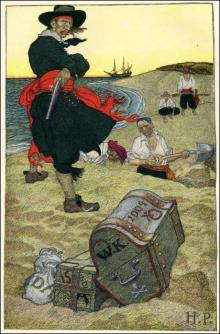 Howard Pyle's Book of Pirates
Howard Pyle's Book of Pirates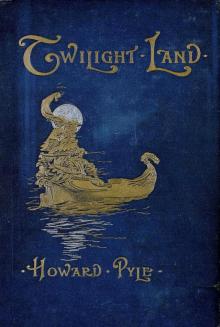 Twilight Land
Twilight Land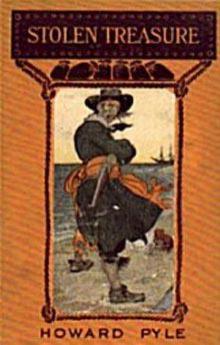 Stolen Treasure
Stolen Treasure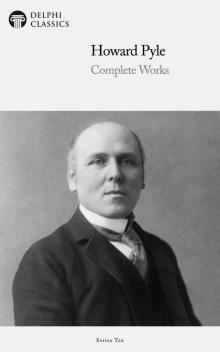 Complete Works of Howard Pyle
Complete Works of Howard Pyle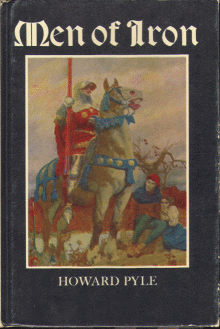 Men of Iron
Men of Iron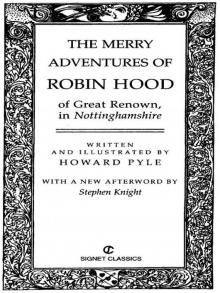 The Merry Adventures of Robin Hood
The Merry Adventures of Robin Hood The Wonder Clock
The Wonder Clock